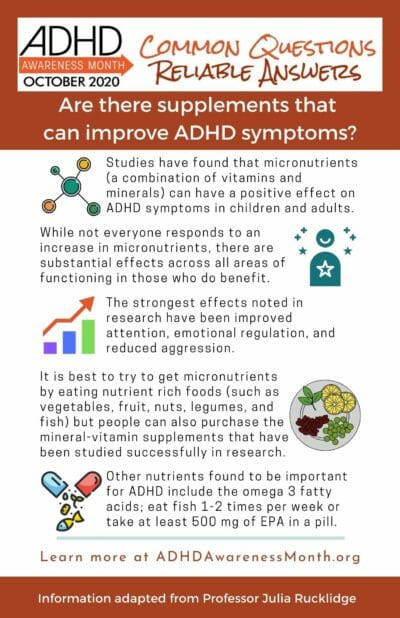Over the last decade, a number of different studies have investigated whether a combination of vitamins and minerals (micronutrients) can have a positive effect on ADHD symptoms in both children and adults. The premise behind a combined approach is that all nutrients are required for optimal brain health, such as making neurotransmitters, fighting inflammation, or assisting with the functioning of the bacteria inside of us. They can also counter the effects of modern diets consisting of mainly ultra-processed foods. While not everyone responds to this approach, for those who do benefit, the effects are often substantial and can be seen across all areas of functioning. While the effect on ADHD symptoms tends to be quite slow (it can take a few weeks to notice changes and the effect tends to grow over a long period of time), some symptoms like explosive rage, can improve in just a few days. The strongest effects noted in research have been improved attention as well as emotional regulation and reduced aggression.
There are very few side effects associated with taking micronutrients. Indeed, anecdotally children are reported to be healthier–skin conditions clear up, fewer colds, fewer infections — when taking additional nutrients with their diet. Rebound does not occur when the nutrients wear off and there does not appear to be an effect on appetite or sleep (as long as the nutrients aren’t consumed too close to bedtime).
It is always best to try to get micronutrients from our food — eating nutrient rich foods like vegetables, fruit, nuts, legumes, and fish. However, for some people that won’t be sufficient, perhaps because of individual differences on top of eating foods that have become nutrient depleted over time (due to poor replenishment in soil, selecting foods that grow quickly, etc). In those cases, source one of the mineral-vitamin supplements that have been studied successfully in research. They are publicly available for purchase.
More research is required; however, the preliminary studies are encouraging and considering the low risk associated with minerals and vitamins, some families may choose to go down this route first before considering alternatives.
Other nutrients found to be important for ADHD include the omega 3 fatty acids — although the best source of omega 3 fatty acids is from fish (and the recommended fish intake is once to twice a week), there is sufficient research to suggest at least 500mg of EPA taken in pill form can have a modest but significant effect on ADHD symptoms. This shouldn’t be surprising given the importance of these fats in brain heath.
About the Author

Julia Rucklidge is a Professor of Clinical Psychology in the School of Psychology, Speech and Hearing at the University of Canterbury and the Director of Te Puna Toiora, the Mental Health and Nutrition Research Lab.
References
- Rucklidge, J. J., Eggleston, M., Johnstone, J., Darling, K., & Frampton, C. (2018). Vitamin-mineral treatment improves aggression and emotional regulation in children with ADHD: a fully blinded, randomized, placebo-controlled trial. Journal of Child Psychology and Psychiatry and Allied Disciplines, 59(3), 232-246. https://doi.org/10.1111/jcpp.12817
- Rucklidge, J. J., Frampton, C., Gorman, B., & Boggis, A. (2014). Vitamin-mineral treatment of attention-deficit hyperactivity disorder in adults: double-blind randomised placebo-controlled trial. British Journal of Psychiatry, 204(4), 306-315. https://doi.org/doi:10.1192/bjp.bp.113.132126
- Rucklidge, J. J., Frampton, C., Gorman, B., & Boggis, A. (2017). Vitamin-Mineral Treatment of ADHD in Adults: A 1-Year Naturalistic Follow-Up of a Randomized Controlled Trial. Journal of Attention Disorders, 21(6), 522-532. https://doi.org/10.1177/1087054714530557
- Rucklidge, J. J., Gately, D., & Kaplan, B. (2010). Database analysis of children and adolescents with bipolar disorder consuming a micronutrient formula. BMC Psychiatry, 10(1), 74-74. https://doi.org/10.1186/1471-244x-10-74
- Rucklidge, J. J., & Harrison, R. (2010). Successful treatment of Bipolar Disorder II and ADHD with a micronutrient formula: A case study. CNS Spectrums, 15(5), 289-295.
- Rucklidge, J. J., Johnstone, J., Gorman, B., Boggis, A., & Frampton, C. (2014). Moderators of treatment response in adults with ADHD treated with a vitamin-mineral supplement. Progress in Neuro-Psychopharmacology and Biological Psychiatry, 50, 163-171. https://doi.org/10.1016/j.pnpbp.2013.12.014
- Rucklidge, J. J., Johnstone, J., Harrison, R., & Boggis, A. (2011). Micronutrients reduce stress and anxiety in adults with Attention-Deficit/Hyperactivity Disorder following a 7.1 earthquake. Psychiatry Research, 189(2), 281-287. https://doi.org/10.1016/j.psychres.2011.06.016
- Rucklidge, J. J., & Kaplan, B. (2014). Broad-Spectrum Micronutrient Treatment for Attention-Deficit/Hyperactivity Disorder: Rationale and Evidence to Date. CNS Drugs, 1-11. https://doi.org/10.1007/s40263-014-0190-2
- Johnstone, J., Leung, B., Gracious, B., Perez, L., Tost, G., Savoy, A., Hatsu, I., Hughes, A., Bruton, A., & Arnold, E. (2019). Rationale and design of an international randomized placebo-controlled trial of a 36-ingredient micronutrient supplement for children with ADHD and irritable mood: The Micronutrients for ADHD in Youth (MADDY) study. Contemporary clinical trials communications, 16, 100478. https://doi.org/10.1016/j.conctc.2019.100478
- Gordon, H. A., Rucklidge, J. J., Blampied, N. M., & Johnstone, J. M. (2015). Clinically significant symptom reduction in children with attention-deficit/hyperactivity disorder treated with micronutrients: An open-label reversal design study. Journal of Child and Adolescent Psychopharmacology, 25(10), 783-798. https://doi.org/10.1089/cap.2015.0105 Darling, K., Eggleston, M., Retallick-Brown, H., & Rucklidge, J. (2019). Mineral-Vitamin Treatment Associated with Remission in Attention-Deficit/Hyperactivity Disorder Symptoms and Related Problems: 1-Year Naturalistic Outcomes of a 10-Week Randomized Placebo-Controlled Trial. Journal of Child and Adolescent Psychopharmacology, 29(9), 688-704. https://doi.org/10.1089/cap.2019.0036

